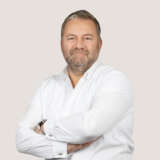Dr. Markus Leyh
Chief of Shoulder, Elbow, Knee Surgery and Traumatology
Photo: Hanna Witte
Excellent surgical expertise, many years of experience and a management style that impresses with clarity, team spirit and vision – that's what Dr. Markus Leyh stands for. As Chief Physician, he heads the Department of Shoulder, Elbow, Knee Surgery and Traumatology at the Sportklinik Hellersen. His goal: to offer patients first-class, modern medical care.
Dr. Markus Leyh studied medicine in Düsseldorf, Sheffield (UK), and Aachen before beginning his internship at a teaching hospital at Charité – Campus Virchow in Berlin. After successfully obtaining his specialist title in surgery, which at the time included training in abdominal, thoracic, vascular, and trauma surgery, he became interested in specialized orthopedics and trauma surgery. Visceral tumor surgery would also have been an alternative for him. This formative and valuable early training in general surgery laid the foundation for his further professional development.
His growing interest in bone and joint surgery led him to the Berlin Marzahn Accident Hospital, the Jewish Hospital in Berlin-Mitte, and temporarily to the orthopedics department of the Hessing Foundation in Augsburg. He obtained a specialization in trauma surgery and, after completing his reformed further training, became a specialist in orthopedics and trauma surgery.
When the opportunity arose in 2009 to take up a position at the Sportklinik Hellersen, the decision was an easy one for him due to his particular interest in joint and bone surgery. He returned to his home region together with his young family. His connection to the Sportklinik Hellersen goes back a long way: in the early 1990s, the current chief physician completed his nursing internship at what was then the Sportkrankenhaus Lüdenscheid.
3 questions for …
How do you ensure a positive working environment in #TeamHellersen?
Dr. Markus Leyh: For a long time, medicine, especially surgery, was characterized by traditional hierarchical management and control structures—structures under which I myself was trained. A certain degree of hierarchy remains necessary because medical responsibility is clearly defined. Nevertheless, I am convinced today that, as in any successful company, satisfied employees are the key to genuine performance.
It is important to ask yourself: What can I exemplify and what does my counterpart need? Learning happens through role models. Values such as friendliness, humor, self-irony, and appreciation, coupled with a leadership style that asks questions, enables participation, and delegates responsibility, create a positive working atmosphere. Politeness and respect are essential.
Training and creating prospects for the future career are, in my opinion, the key drivers of shared success. I don't believe in the concept of work-life balance in the traditional sense. Instead, I am convinced that work that brings joy is the most important pillar of a fulfilling life, after family and health. When performance is recognized and valued beyond this—and this does not have to be financial in nature—an environment is created in which people enjoy working.
However, it is also true that destructive or dissatisfied employees—the “bad apples”—must be consistently removed to prevent the good apples from spoiling as well.
“There are always moments that make me happy—whether it's when we can calm children down, help patients after an injury, or laugh together about a funny situation.”
Dr. Markus Leyh
Chief of Shoulder, Elbow, Knee Surgery and Traumatology
What are your goals for the coming years in your position as Chief Physician of Shoulder, Elbow, Knee Surgery, and Traumatology, and how do you intend to achieve them with your team?
Dr. Markus Leyh: My goal is to further strengthen the clinic both regionally and nationally and to have the department certified in various areas. I would also like to see the surgeons individually certified. The training of our employees is particularly close to my heart. We need a new generation of specialized surgeons to meet our high standards in the years to come. At the same time, it is important to successfully lead the clinic into the modern age and meet the challenges of health policy—and I am convinced that we are on the right track.
What is particularly important to you in your work?
Dr. Markus Leyh: Medicine is an incredibly exciting field of work. We work for and with people, can be scientifically active, and combine this with a manual component. It is particularly fulfilling to achieve directly visible, mostly very positive results in surgery—both for the patient and for ourselves. It is a joy to help patients return to their everyday lives and careers and to receive their gratitude in return.



























